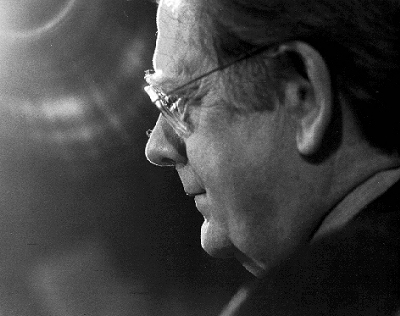I remember where I was when Norrie died. My wife cried out something or other, and told me she had just heard on the CBC the news, that “Northrop Frye is dead.” It was definitely a shock. He was, I was going to say, so young. By today’s standards, he wasn’t that old. But he was gone, and that wonderful voice of wisdom and of unparalleled scholarship was gone, too. The conference planned to celebrate his 80th birthday became a conference of retrospection on his career.
But Northrop Frye had already been dead for some time.
Not dead physically, of course, but dead in terms of his reputation, in terms of influence, in terms of his place in the intellectual world. And nowhere was his reputation more collapsed than in the country of his birth and that earlier had been proud to claim him as his own, Canada.
Frye, as Bob Denham has reminded us, was for a time one of the most cited thinkers. For a period he had remarkable influence in the academy—and not just in the academy, but in society more generally, especially Canadian society. After all, nobody had more influence on the formation of Canadian literature as a discipline, and Canadian studies more generally, than he did. He was a “public intellectual,” consulted by the Trudeau government, appearing on television, even consulted in the development of Expo 67 in Montreal. But Frye’s influence vanished astonishingly rapidly.
Outside of Blake studies, his influence was intense but brief, beginning more or less with the publication of Anatomy of Criticism, and abruptly ending in the mid 70s in the centres of academic power, where it counts. Bloom’s A Map of Misreading, basically a repudiation of Frye, is the indicator that the academic establishment would no longer tolerate Northrop Frye. He was out. Derrida was in.
Viewed more closely, Frye was always more popular with students than with academics. For academics, there was always something uncomfortable and even unacceptable about Frye, and that explains, in part, why his reputation dwindled and disappeared as rapidly as it did. Now, if you cite Frye favourably in a conference paper or an article or in some other academic setting, the likely reaction of your audience will be disbelief, if not open ridicule. Canadianists have long since repudiated his ideas about Canada, and the once-famous Conclusion to a Literary History of Canada is now treated as colonialist bric-a-brac. I hope I am exaggerating.
Yes, Frye is dead, in more than one sense. True, there is a group of what Professor Denham calls “keepers of the flame,” but apart from a rather small (older) group, interest is feeble.
Last spring, at Carleton University, I met with Joseph Adamson and Michael Happy at the annual Social Sciences / Humanities Congress. We wanted to find a way to stimulate interest in Frye, to bring back a focus on his work that would actually do justice to this vital thinker. For years I’ve been wanting to start a journal on Frye-related concerns. I wanted to get young people interested in Frye—really, to acquaint a new generation with this powerful and interesting thinker. I wondered if a society should be formed. Joe and Michael had similar ideas and wishes, and Michael had the brilliant idea of starting a blog, which you see here, and which has thrived mightily under the direction of Michael and Joe.
What I wanted, and what I believe they wanted, too, was not just a memorializing-biographical-bibliographical approach to Frye, but a forum which would stimulate interest in the sort of ideas that Frye worked with, that would develop and apply, and explicate in a fair and creative way, what Frye did, what Frye thought. Frye has been so misrepresented, so caricatured and distorted, that the actual content of his ideas has rarely been discussed or given a real hearing. In my own work, as his last Ph.D. student, I have always intended to follow his lead in developing the sort of ideas he pioneered, and my books Male Envy and 13 Ways of Looking at Images, though superficially very different from Frye, are yet, in my view, in the direct line of his thought.
To me, the extraordinary defacement of Frye’s thought is in itself a subject of deep interest. Why is Frye not accorded the proper attention that a thinker of his depth and originality deserves? I have always believed that there is something actually threatening about Frye, especially in the academy.
I wonder if others share this view. And I wonder what we can do about it. Bring on the new generation!

